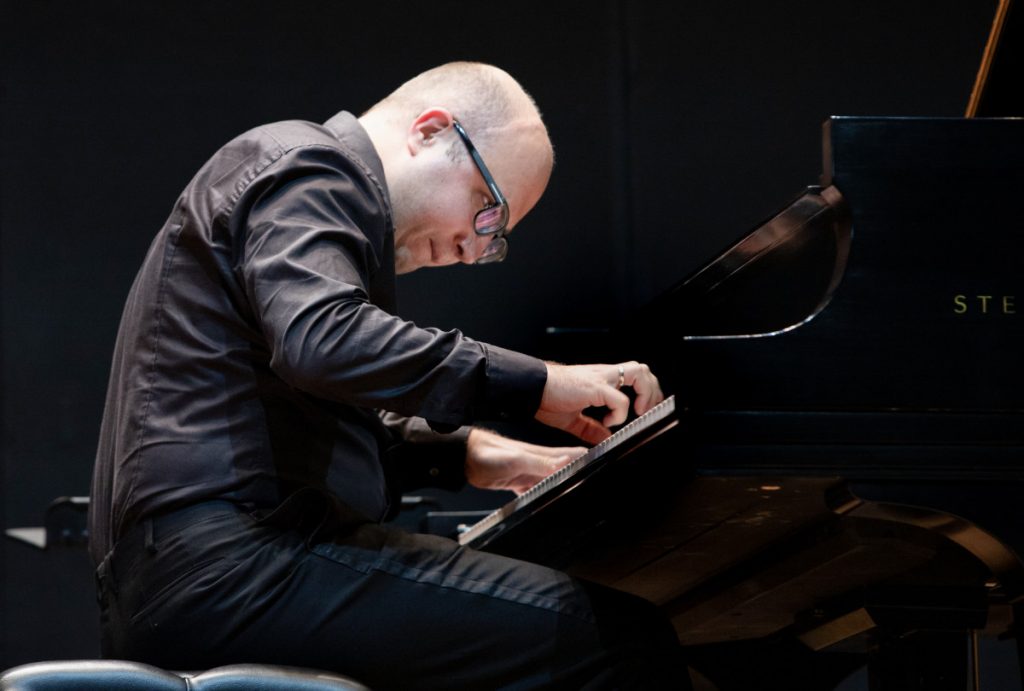
As part of a society’s infrastructure, as explored by the Week Five theme, music is often considered a universal pillar — and a performance.
Tonight will open an opportunity to engage in discussion and analysis of Russian society through its music.
The Chautauqua Symphony Orchestra will perform alongside piano soloist Alexander Gavrylyuk at 8:15 p.m. tonight in the Amphitheater; under the baton of Music Director and Principal Symphonic Conductor Rossen Milanov, the CSO will perform two pieces: Rachmaninoff’s “Rhapsody on a Theme of Paganini,” Op.43; and Shostakovich’s Symphony No. 5 in D Minor, Op. 47.
Milanov said he is looking forward to “sharing the stage with one of Chautauqua’s favorite musicians.”
Ukrainian-born Australian pianist Gavrylyuk is internationally recognized as one of the leading pianists of his generation for his electrifying and poetic performances. He currently serves as Artist-in-Residence at Chautauqua Institution and is artistic adviser of the School of Music’s Piano Program. Both pieces in tonight’s program feature prominent piano parts.
“Every time Alexander performs at the Amphitheater it is a major musical event,” Milanov said. “This year we will be performing one of the greatest and richest works in the 20th century repertoire: Rachmaninoff’s ‘Rhapsody on a Theme by Paganini.’ ”
Many of Rachmaninoff’s works consist of solo violin features, but this piece includes a concertante work for solo piano and orchestra. The premiere in Baltimore by the Philadelphia Orchestra in 1934, with Rachmaninoff as the piano soloist and Leopold Stokowski as conductor, was an immediate success and has since become a cornerstone of the repertoire.
Following Rachmaninoff, the CSO will conclude with a piece by Dmitri Shostakovich, a composer with whom the CSO is very familiar, having performed Shostakovich’s Eighth Symphony last season and the Leningrad Symphony with the Music School Festival Orchestra in 2018.
“In recent seasons, we have been exploring in Chautauqua some of (Shostakovich’s) most important and deeply emotional symphonies,” Milanov said. “This year we will perform his most popular one — No. 5.”
Shostakovich was composing during the 1930s, a time when the Soviet Union reeled under the destruction of Joseph Stalin. Stalin himself went to a performance of Shostakovich’s Lady Macbeth of the Mtsensk District, and soon after the state newspaper Pravda condemned the work for corrupting the Soviet spirit. Then, the opera disappeared; every publication and political organization in the country placed personal attacks on its composer. Living in fear, Shostakovich rejected his own Fourth Symphony while in rehearsal and decided to premiere Symphony No. 5 with the subtitle “A Soviet Artist’s Response to Just Criticism.” The work displayed lyricism, a heroic tone and inspiration from Russian literature. Other listeners hear a subtext of critical despair beneath the crowd-pleasing melodies.
After tonight’s performance, there will be a short documentary movie explaining the compositional process as well as some of the important themes that Shostakovich reflects in his music, Milanov said.




